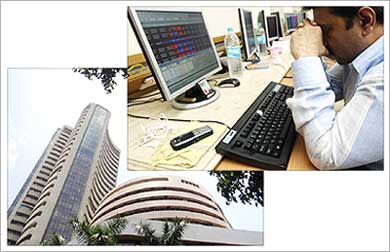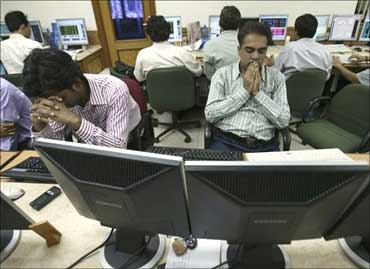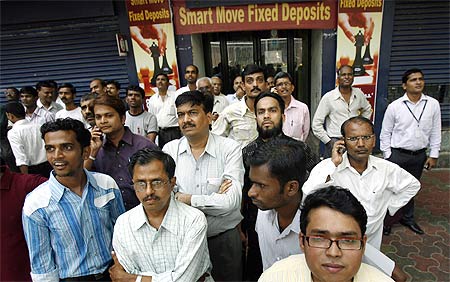How investors can benefit from Budget
Last updated on: February 22, 2011 13:41 IST
Image: Bombay Stock Exchange.
Devangshu Datta
A transaction occurs only when the buyer and seller are both satisfied with price.
If it's a financial asset, the buyer thinks it will outperform, while the seller believes better returns can be found elsewhere. We see these opposed views reflected everyday in millions of transactions.
A market index rises when people with deeper pockets (not necessarily a larger number of people) bet that shares will rise in value. As the demand they generate cannot be met by supply at the current price, prices rise until more supply is dragged out.

How investors can benefit from Budget
Image: Budget to impact markets.
The demand-supply imbalance is caused by many reasons and it can be very temporary. A rise in an index for example, may come during a holiday period on low volume when many regular participants are out of the market.
It may also occur on skewed advance-decline ratios. A few heavyweight counters may rise while the majority of listed companies fall.
In that case, a weighted index like the Nifty or Sensex may rise even though most shares are losing value and this can obscure the true picture.

How investors can benefit from Budget
Image: Anxious investors.
However, the rise in the indices in the past week has been significant. The Nifty has moved up around 6 per cent in a move backed by most sectors. Volumes have been reasonable though lower than during the selling on the way down.
Is there a case to be made for becoming a buyer under the circumstances? After all, the Nifty is still 900-odd points from its recent highs. That translates into 15 per cent return if the recovery goes all the way back to 6300.

How investors can benefit from Budget
Image: Favourable Budget helps investors.
The Budget creates special circumstances because the bias introduced by restrictions on short-selling become most apparent. If the Budget is accepted to be favourable, a position trader who is long from earlier lower levels, gains.
If the Budget is bad, he may still gain by selling against delivery and buying back the same portfolio later from lower levels.
That way, he retains the portfolio and he's picked up a cushion of cash. There's no transactional hassle with buying shares and then possibly, selling them.

How investors can benefit from Budget
Image: Budget, a deciding factor.
The inverse action of being short before the Budget is as logical. If the Budget is not favourable, somebody who has sold shares at higher levels will be able to cover post-Budget at lower levels.
But this is effectively, impossible to do in the cash market. It involves painful, expensive manoeuvres to borrow shares.
Who is supplying the shares at the current moment? Right now, it's retail sellers. We know this because institutional involvement in the latest rally has been minimal.

How investors can benefit from Budget
Image: Markets may rise.
On several sessions, the net domestic institutional investor (DII) and foreign institutional investor (FII) position has been in the mere hundreds of crore, a tenth of normal institutional transactions.
That gives us some clarity about the rally. It is being driven by one bunch of relatively well-heeled and optimistic traders who are buying from another bunch of more pessimistic and more monetarily stretched traders.

How investors can benefit from Budget
Image: Market lost over 17 per cent from its peak.
The big money has stayed out. On the way down, as the market lost over 17 per cent from its peak, the big money was selling.
Presumably, institutional consensus is to stay out until the Budget actually happens.
Are the institutions correct in their assessment? It doesn't really matter. Their money makes the market and no rally can be sustained for a long period, without their active participation.

How investors can benefit from Budget
Image: Bombay Stock Exchange.
Of course, if the institutions turn buyers, they can push things up. Otherwise, there would be an exhaustion point in the rally when long traders try to book profits and there isn't any counter-party.
So, as a trader, what one really needs to know is the institutional reaction to the Budget. The Budget itself is less material than the reaction to it. In Keynesian terms, this is like betting on a beauty contest winner.

How investors can benefit from Budget
Image: High expectations.
You need to know the judges' attitude rather than make independent value-judgements about relative attractiveness.
What Budgetary provisions would turn institutions into buyers? Reforms, tax-cuts, rationalisation of excise and customs duties, some more paring down of the License Raj.
If you think Pranab-babu will deliver on these fronts, go long. If not, be prepared to short after the speech.

How investors can benefit from Budget
Image: Budget may not have big-bang reforms.
Note another thing. The Budget is more or less drafted by mid-December.
At that time, the stock market was booming but the government was (rightly) worried about inflation and raising funds to cut the fiscal deficit.
Most tax reforms would be deferred for the GST. That makes it much less likely that this would be a big bang reformist Budget.














article